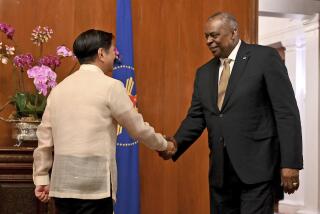Bush Aide Takes Cautious View of Aquino’s Future
- Share via
WASHINGTON — Although the Bush Administration had earlier voiced confidence that Philippine President Corazon Aquino would quickly overcome the military rebellion against her government, National Security Adviser Brent Scowcroft on Sunday adopted a new, less optimistic stance toward the revolt and Aquino’s political future.
During two television interviews, Scowcroft acknowledged that the situation in the Philippines is “difficult” and that the rebellion “is going to take a long time to clean up.”
Scowcroft also appeared to be seeking to put some political distance between the United States and Aquino, who on Friday asked for American warplanes to provide air cover and thus help put down the attempted coup.
“We made it clear to her (Aquino) that we did not want to get into the business of killing Filipinos,” Scowcroft said on NBC’s “Meet the Press.” Senior Bush Administration officials have told The Times that Aquino originally asked for the U.S. planes to bomb rebel-held air bases, fuel dumps and a freighter at sea.
Asked on CNN’s “Newsmaker Sunday” whether Aquino had hurt herself politically by having to ask for American help, Scowcroft replied: “I would think not. I would think not. But only time can tell on that.”
Experts on U.S.-Philippine relations predict that, having cast its lot firmly with Aquino during the early hours of the coup attempt that began last Friday, the Bush Administration will continue to support her but will also start to press her harder for political changes, once the rebellion is put down.
“I think politically, we’re still going to back this (Aquino) government very strongly, and we should,” said Larry A. Niksch, an Asian scholar at the Congressional Research Service. “But I think this will further the likelihood that the United States, people at the World Bank, the Japanese, are going to insist on real reforms, such as land reform, better delivery of rural services, and new policies on foreign investment and trade.”
Niksch said he believes that even after the rebellion is over, its effects will be felt for a long time. “We’re in for a prolonged period of tension in the Philippines, several months of coup plots and rumored coup plots. And the foreign investors will just sit back and wait.”
Paul Kreisberg of the Carnegie Endowment for International Peace, another specialist on Asian affairs, said that the United States seems to be reexamining its policies and assumptions about the Philippines.
“My impression is that no one in Washington knows where to go from here,” Kreisberg said. “She (Aquino) is in trouble, and we (the United States) are in trouble.” Still, he added, “I don’t think anybody (in the Bush Administration) has got a clear idea of who else they can support.”
Aquino’s term as president ends in 1992, and she has said repeatedly that she does not plan to run for reelection. But some U.S. officials have said they believe she might eventually be persuaded to change her mind.
If Aquino should step down, most U.S. officials would prefer to see Defense Secretary Fidel V. Ramos succeed her. He has close and longstanding ties to American military officials and has often voiced support for a continued U.S. military presence in the Philippines.
But Kreisberg said he believes the current, prolonged rebellion has also damaged Ramos’ political standing. “What this incident has done is to weaken Ramos’ candidacy,” he said. “Ramos was the guy who was supposed to know what the military was going to do and to control the military. I think it was a real blow to him.”
During the television interview on CNN Sunday, Scowcroft spoke bluntly of the deep political cleavages within the Philippine armed forces.
He said the Aquino government is doing “reasonably well” against the military rebels but added: “ . . . One of the problems has been apparently a number of military units sort of sitting on the fence to see what happens. But President Aquino is confident, and therefore, I think we should be.”
Scowcroft expressed no strong condemnation of the military rebels. “This is an attempted military coup,” he said. “And of course, the military have been ambivalent about her (Aquino) more than the civilians all along. And I think they probably feel that she has not prosecuted the struggle against the New People’s Army (the Communist insurgency) as assiduously as she might.”
Secretary of State James A. Baker III, appearing on CBS’ “Face the Nation,” repeated previous U.S. statements that have condemned the rebels for undermining the political system in the Philippines.
“What you have here is a situation where people are trying through bullets and bayonets to overthrow a freely elected government,” Baker said. “And we defend democracy. We defend democracy around the world.”
Meanwhile, a special inter-agency task force of U.S. officials agreed Sunday to speed some new equipment to the Philippine armed forces. The equipment includes an unspecified number of light anti-tank weapons and approximately 1,000 pounds of medical supplies.
More to Read
Sign up for Essential California
The most important California stories and recommendations in your inbox every morning.
You may occasionally receive promotional content from the Los Angeles Times.













